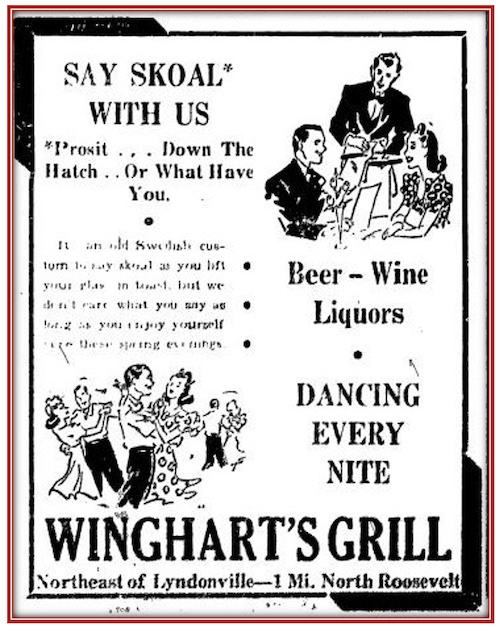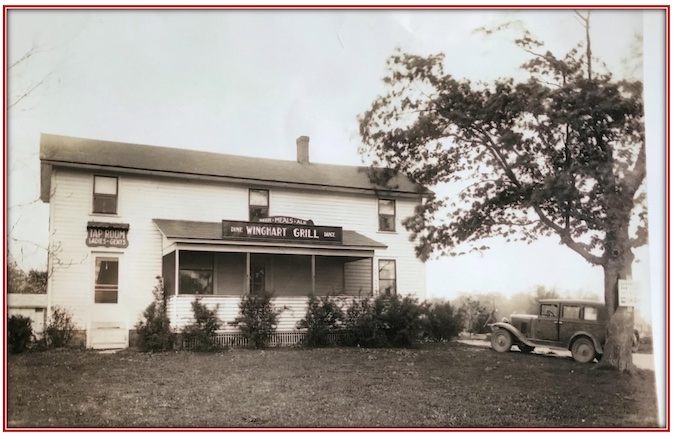Historian’s Column: ‘Bootlegging Trio’ in Yates showed entrepreneurial prowess during Prohibition
By Catherine Cooper, Orleans County Historian
“Illuminating Orleans” – Vol. 3, No. 35
YATES – In 1917, a young Rochester couple, Joseph J. Winghart, and his wife Mayme, purchased lakeside property at the northernmost end of Morrison Road in the Town of Yates. They built a small cottage there for use as a summer home.
Joe was a mechanic and taxi-cab driver. Bernie, Joe’s brother, also a mechanic, loved to fish on Lake Ontario. Mayme was, by all accounts, a feisty and formidable lady.
The National Prohibition Act took effect on January 16, 1920. Entrepreneurs soon devised ways of supplying liquor. Joe, Mayme, and Bernie found themselves ideally situated and suited to take advantage of new retail opportunities.
Bernie’s daughter, Joan Winghart Wilcox Sullivan, describes the exploits of “The Bootlegging Trio” as they were known, in the book “Bernie, You’re a Bootlegger: a Family’s Escapades During the Prohibition Era.” It was published in 2010.
Their isolated lakeside property was an ideal location for receiving liquor from Canada. Joe and Bernie built a two-story boathouse. The second floor was necessary for height so that a light could be placed high in the window to guide boats landing at night.
The boathouse had an overhead door with a steel track leading down to the water. A boat could be winched up the track and into the boathouse, out of sight. A pulley and cable system were then used to unload the cargo into a cement lined underground cellar area which could hold over 200 cases. The cellar could also be accessed by a cement lined underground tunnel.
Joe purchased two new six-cylinder Chevrolets from the Beers Dealership in Medina. He built up the springs to accommodate around ten cases of liquor, with at least seven inches of space between the fender and tire. Troopers would sit on hotel porches in small towns like Murray on Route 104, on the lookout for cars with heavy loads, which they would pursue. He also purchased a Chris Craft boat which was equipped with two liberty airplane engines, surplus from the war and easily converted.
Bernie made regular trips to Coburg. Canadian suppliers were ready with fast boats loaded with whiskey. The return trips were at night with no running lights and landed at various places along the shoreline. If you used the same route regularly, you would get caught.
The trio supplied the Lyndonville area. Mayme, equipped with a revolver and rifle, delivered whiskey to Rochester clients, while Bernie made deliveries to Niagara Falls, where the trio were associated with “The Black Hand Gang.” He combined deliveries with dating. Driving a car loaded with whiskey, he would take a girlfriend to the movies, then park at a gas station. The vehicle would be unloaded while he enjoyed a movie and dinner.
Bernie maintained that his reason for supplying Canadian whiskey was his desire to save people from the very real dangers of bathtub gin or homemade hooch, which had been known to cause sickness, blindness and even death.
The trio had some close calls. On one occasion in 1929, Bernie and his crew had to be rescued from their sinking boat, but they managed to toss their cargo overboard before the arrival of the Coast Guard.
In the mid-1920s, Ross Hollenbeck, a newly elected Orleans County Sheriff, tried to control these illegal activities. One night, Bernie, driving a car with a load of whiskey, saw a police roadblock ahead when he turned on to Route 18 at Kuckville. He turned off his lights and ran the roadblock. He later said, “I almost killed two police. If they hadn’t jumped out of the way, I would have killed both of them.”
A week later, when Bernie stopped for gas on Route 104 in Gaines, Sheriff Hollenbeck walked up to his car and said:
“Bernie, the next time I get in front of you, and you don’t stop, I’m gonna shoot you.”
Bernie replied: “If you bother me anymore, I’m working for the Black Hands in North Tonawanda, and they will pop you off.”
He was never bothered again.
When Prohibition ended, the trio had to adapt to a new lifestyle. The Lyndonville Enterprise of April 11, 1935 reported that:
“Joseph Winghart has remodeled the farm home on the corner of Lake and Morrison Roads into an attractive place to be known as the Winghart Tavern. A large crowd attended the opening party on Friday night.”
Several sources indicate that the farmhouse had been operated as a speakeasy prior to the repeal of Prohibition.

“Dancing Every Nite” at Winghart’s Grill. This advertisement appeared in the Medina Tribune May 23, 1940.
The announcement: “Winghart’s Grill for sale” appeared in the Medina Journal, April 10, 1941. Joe and Mayme purchased a hotel at Point Breeze, the Hotel Winghart. They later moved to the Thousand Islands and then, to Florida. Joe died in 1968, Mayme in 1989 and Bernie in 1998.
Forthcoming column: Lake Shore Villa and the Park House.































































